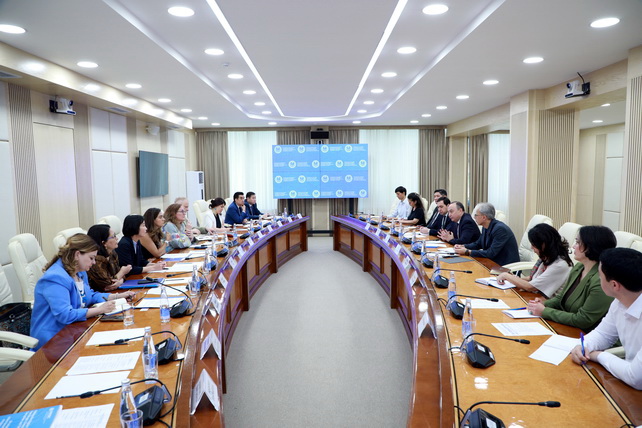
Eldor Aripov Holds Meeting with UN Representatives
Eldor Aripov Holds Meeting with UN Representatives
Tashkent, Uzbekistan (UzDaily.com) — On 30 June 2025, the Institute for Strategic and Regional Studies under the President of the Republic of Uzbekistan (ISRS) hosted a meeting between its Director, Eldor Aripov, and representatives of key UN agencies operating in the country, including the ILO, UNESCO, IOM, UNODC, UNAIDS, UNDP, UNICEF, WHO, FAO, and UNFPA.
During the in-depth discussions, the parties reviewed priority areas of cooperation and explored prospects for its further expansion.
Opening the meeting, Eldor Aripov emphasized the importance of regular interaction with the United Nations to strengthen the partnership and develop joint solutions to key global and regional issues.
In turn, UN Resident Coordinator in Uzbekistan Sabine Machl praised the country’s contribution to addressing global challenges, including climate change and the promotion of gender equality. She expressed sincere gratitude to Uzbekistan’s leadership for its comprehensive support of the UN’s activities. According to her, such cooperation is essential for advancing shared priorities and achieving the Sustainable Development Goals (SDGs).
Participants noted with satisfaction the high level of cooperation between Uzbekistan and UN structures. It was highlighted that 166 joint programs and projects are currently being implemented, covering a wide range of priority areas. Moreover, thanks to Uzbekistan’s initiatives, the UN General Assembly has adopted 13 special resolutions, underscoring the country’s growing international standing.
The discussions also touched on key areas of cooperation in the context of preparations for the 80th session of the UN General Assembly.
A special focus was placed on addressing climate challenges. Participants praised Uzbekistan’s active position on environmental security, including its commitment to combating land degradation and promoting green technologies. These initiatives significantly contribute not only to the country’s sustainable development but also to the formation of a unified regional climate agenda.
In the context of environmental issues, the meeting also addressed food security. It was noted that Uzbekistan is introducing innovative approaches in the agricultural sector and modernizing water supply systems—measures that are particularly important amid climate change and population growth.
The discussion also covered investment in the demographic dividend. It was noted that Uzbekistan is undertaking large-scale efforts to create jobs, modernize the education system, and expand opportunities for youth self-realization. The country continues to have a predominantly young population, with 55 percent of citizens under the age of 30. Projections indicate that the working-age population (aged 15 to 64) will grow from 23.6 million in 2023 to over 33 million by 2050.
Uzbekistan’s progress in the field of human rights was also highly commended, particularly efforts to expand women’s rights and strengthen their role in socio-political and economic life. Within the framework of the Uzbekistan–2030 strategy, extensive measures are being implemented to enhance women's participation across political, public, and economic spheres. Over the past five years, the number of women entrepreneurs in Uzbekistan has doubled, with women now making up around 50 percent of the workforce in various sectors of the economy and industry.
Migration issues were also discussed in detail. The importance of building a safe and orderly migration policy focused on protecting citizens’ rights and interests was emphasized. In this regard, Uzbekistan’s active support for labor migrants, its efforts to improve social protection mechanisms, and its facilitation of legal employment abroad were positively noted.
Guests acknowledged Tashkent’s growing role in ensuring regional security. Special attention was paid to Afghanistan as a key focus of Uzbekistan’s foreign policy, with particular importance placed on consistently involving the neighboring country in regional integration processes.
Healthcare reform was another topic of discussion. It was noted that Uzbekistan is undertaking systematic reforms aimed at improving the quality and accessibility of medical services. Active cooperation with the WHO supports the implementation of international standards and the expansion of primary healthcare coverage.
At the conclusion of the meeting, both sides reaffirmed their commitment to an open and sustainable partnership. They expressed readiness to continue such meetings on a regular basis, allowing for more effective coordination of joint efforts and advancement of priority areas of cooperation between Uzbekistan and the United Nations.